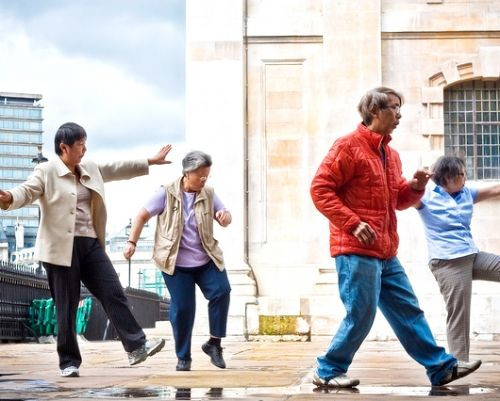Tai chi beats back depression in the elderly, study shows

The numbers are, well, depressing: More than 2 million people age 65 and older suffer from depression, including 50 percent of those living in nursing homes. The suicide rate among white men over 85 is the highest in the country — six times the national rate.
And we're not getting any younger. In the next 35 years, the number of Americans over 65 will double and the number of those over 85 will triple.
So the question becomes, how to help elderly depressed individuals?
Researchers at UCLA turned to a gentle, Westernized version of tai chi chih, a 2,000-year-old Chinese martial art. When they combined a weekly tai chi exercise class with a standard depression treatment for a group of depressed elderly adults, they found greater improvement in the level of depression — along with improved quality of life, better memory and cognition, and more overall energy — than among a different group in which the standard treatment was paired with a weekly health education class.
The results of the study appear in the current online edition of the American Journal of Geriatric Psychiatry.
"This is the first study to demonstrate the benefits of tai chi in the management of late-life depression, and we were encouraged by the results," said first author Dr. Helen Lavretsky, a UCLA professor-in-residence of psychiatry. "We know that nearly two-thirds of elderly patients who seek treatment for their depression fail to achieve relief with a prescribed medication."
In the study, 112 adults age 60 or older with major depression were treated with the drug escitalopram, a standard antidepressant, for approximately four weeks. From among those participants, 73 who showed only partial improvement continued to receive the medication daily but were also randomly assigned to 10 weeks of either a tai chi class for two hours per week or a health education class for two hours per week.
All the participants were evaluated for their levels of depression, anxiety, resilience, health-related quality of life, cognition and immune system inflammation at the beginning of the study and again four months later.
The level of depression among each participant was assessed using a common diagnostic tool known as the Hamilton Rating Scale for Depression, which involves interviewing the individual. The questions are designed to gauge the severity of depression. A cut-off score of 10/11 is generally regarded as appropriate for the diagnosis of depression.
The researchers found that among the tai chi participants, 94 percent achieved a score of less than 10, with 65 percent achieving remission (a score of 6 or less). By comparison, among participants who received health education, 77 percent achieved scores of 10 or less, with 51 percent achieving remission.
While both groups showed improvement in the severity of depression, said Lavretsky, who directs UCLA's Late-Life Depression, Stress and Wellness Research Program, greater reductions were seen among those taking escitalopram and participating in tai chi, a form of exercise that is gentle enough for the elderly.
"Depression can lead to serious consequences, including greater morbidity, disability, mortality and increased cost of care," Lavretsky said. "This study shows that adding a mind-body exercise like tai chi that is widely available in the community can improve the outcomes of treating depression in older adults, who may also have other, co-existing medical conditions, or cognitive impairment.
"With tai chi," she said, "we may be able to treat these conditions without exposing them to additional medications."



























